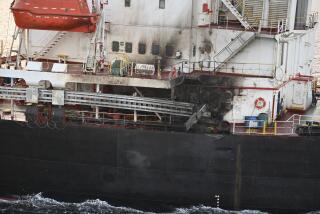Blockade: Do It but Do It Right
- Share via
In the folk tale “The Belling of the Cat,” the mice agree that all will be safer if the cat is required to wear a bell--but no mouse is found to bell the cat. The member states of NATO have never doubted that Europe would be safer if Serbia were denied the materiel it needs to conduct its aggression against Bosnia, but like the mice they have declined to take the necessary action.
On Monday night the Security Council of the United Nations voted to impose a naval blockade on Yugoslavia (Serbia and its satellite, Montenegro), providing for the first time that military power could be used to enforce the trade sanctions imposed on Serbia last May. The naval blockade is to include both the Adriatic Coast and the Danube River and comes as an admission of the obvious; namely, that the trade sanctions have been without military effect.
The key question whenever military sanctions are imposed by the United Nations is: By means of whose military? Because that question so rarely has a clear answer, kicking a regional problem upstairs to the United Nations can be a way of avoiding it. This time, however, a European question may get a European answer.
The nine-nation Western European Union is expected to announce Friday that its Adriatic warships will impose the blockade. NATO, after studiously avoiding any Balkan engagement, is about to begin discussions on participating in the blockade. And the United States is prepared to press for a total blockade of Serbia if the naval blockade fails to halt smuggling of strategic supplies.
Until now, the stance that the West has chosen to take on Bosnia-Herzegovina has amounted to acquiescence in the partition of that country by Serbia and Croatia. On the Serbian side, the effect of that partition has officially been described to the U. N. Commission on Human Rights as “extermination” of the Muslim population.
It remains to be seen whether the new measures will bell the cat or not. The “ethnic cleansing” of Bosnia-Herzegovina, besides being an international crime of major scope, is an exceedingly ominous precedent in a world of ethnically heterogeneous states. Whether the new world order will or will not acquiesce in the irredentist principle of ethnic purity is a question now about to be answered. We can only hope that the answer will be as serious as the peril at hand.
More to Read
Sign up for Essential California
The most important California stories and recommendations in your inbox every morning.
You may occasionally receive promotional content from the Los Angeles Times.













